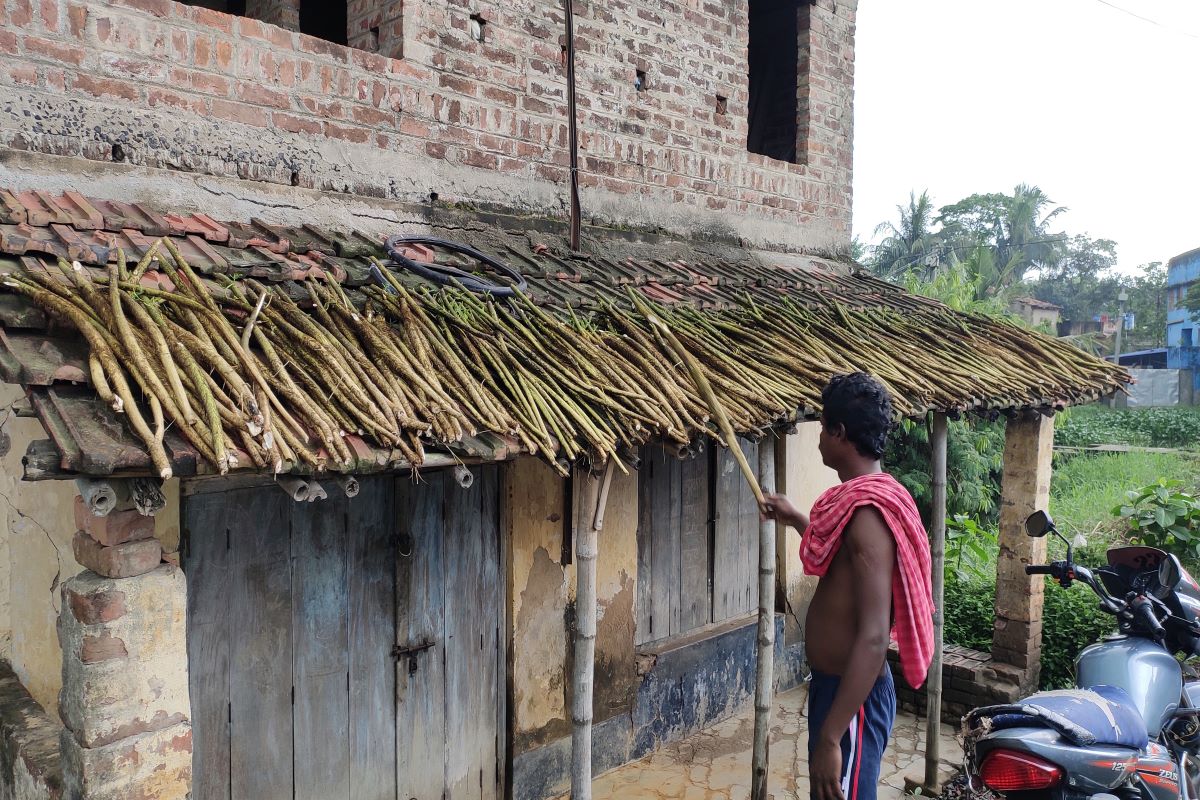Father son duo drown in pond
Eyewitnesses said that Govinda Nag, a cook, was in an intoxicated state when he took his son for a swimming lesson to the nearby pond.
“For generations, we are carrying on the cultivation of shola, it fetches four times more profit than paddy cultivation. Shola is an aquatic herb, it grows well in controlled water-logging levels, but the Dankuni irrigation canal which has not been dredged has become a curse for all the shola cultivators”

A shola cultivator checking the dried-up stems (SNS)
Bengal’s shola decorative items have a high demand in nearly all religious as well as social occasions. Shola cultivation fetches a huge profit but the district shola cultivators are facing unfavourable growing conditions mostly due to the indifferent attitude of the local administration.
Reclaiming the Dankuni irrigation canal is a long-standing demand of the shola cultivators. The shola craft is an age-old tradition of Bengal. It is the art of making delicate, intricate, decorative objects from the soft, supple, porous and lightweight core of the shola stem.
Shola is an aquatic herb that grows wild in marshy waterlogged areas. Shola is also referred to as Indian cork. The full-grown shola herb stems are uprooted, kept submerged in water for a time period and finally the stems are dried in sunlight until they turn brown.
Advertisement
The shola artiste then peels off the outer brown cover to expose the white softcore ready to be given shape for a number of decorative items. Shola is extensively cultivated in Jhakari, Bora in the Singur area. Wholesale dealers from different districts much ahead of the festive season buy the dried-up stem of the shola plant.
Dilip Das and other cultivators said: “For generations, we are carrying on the cultivation of shola, it fetches four times more profit than paddy cultivation. Shola is an aquatic herb, it grows well in controlled water-logging levels, but the Dankuni irrigation canal which has not been dredged has become a curse for all the shola cultivators. For healthy growth and height of a shola herb, the herb at any stage of growth should not get inundated in water, but the Dankuni irrigation canal, which has lost its depth due to excessive siltation, overflows during a heavy downpour.
“The cultivation of shola herb in acres of the land area gets totally submerged, the stagnant water destroys the entire shola cultivation, our repeated requests to the concerned irrigation department are all in vain. Now the cultivation of shola herb is limited to smaller areas in Bora.
Right from shola herb cultivation in a chain system fetches a very good profit to the malakaris (the shola artistes and craftsmen) since the finished decorative items have huge demand in all social and religious occasions taking place around the year in different states of India,”
One of them said: “In Bengal festive season starts from Vishvakarma puja. Hence the demand for shola decorative items is at its peak. It is our long-standing demand to the concerned department to reclaim the Dankuni irrigation canal and save the Bengal shola cottage industry from total ruin. Thousands of people are involved in the shola industry from generation to generation. It is a duty and responsibility of all of us to uphold the age-old tradition of Bengal
Advertisement